|
|
|
Sort Order |
|
|
|
Items / Page
|
|
|
|
|
|
|
| Srl | Item |
| 1 |
ID:
138330
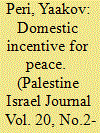

|
|
|
|
|
| Summary/Abstract |
Immediately after the polls closed, when Israel opened its eyes to an old new political reality, it was clear that the critical issues of sovereignty regarding the Palestinians will inevitably return again to the forefront. As a result, the window of opportunity which is open in the Middle East will be highlighted for all to see. The last Israeli elections, like a number of elections in the last decade, began with a clarion call to tackle social issues, economic issues and other internal matters, but in practice, the items most on the public agenda during the public campaigns were those of security and negotiations.
|
|
|
|
|
|
|
|
|
|
|
|
|
|
|
|
| 2 |
ID:
151813


|
|
|
|
|
| Summary/Abstract |
The ugly rhetoric that erupted between Israeli and American leaders in 2014 epitomized the rapid deterioration of the relations between the two leaderships, if not yet the two countries, since Barack Obama became the American president and Binyamin Netanyahu the Israeli prime minister in 2009. To be sure, there have been conflicts between Israeli and American leaders in the past, yet none of them reached the level of personal rancour seen in 2014 with Israeli Defence Minister Moshe Ya’alon disparaging Secretary of State John Kerry’s peace efforts as ‘obsessive and messianic’ and ‘senior administration officials’ deriding Netanyahu as a ‘chickenshit’ and a ‘coward’. Even the much vaunted security relationship between the two states began to suffer in 2014 as the US held up shipments of Hellfire missiles to Israel during its summer 2014 war against Hamas. While a renewal of the bilateral 10-year military aid agreement was signed in 2016, and the ascension of Donald Trump to the presidency may herald an improvement in bilateral relations, it remains to be seen if the damage to the US‒Israeli relationship done in the 2014–2015 period will be overcome.
|
|
|
|
|
|
|
|
|
|
|
|
|
|
|
|
| 3 |
ID:
049544
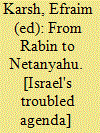

|
|
|
|
|
| Publication |
London, Frank Cass, 1997.
|
| Description |
viii, 349p.
|
| Series |
Cass studies in Israeli history, politics and society
|
| Standard Number |
0714643831
|
|
|
|
|
|
|
|
|
|
|
|
Copies: C:1/I:0,R:0,Q:0
Circulation
| Accession# | Call# | Current Location | Status | Policy | Location |
| 039444 | 320.95694/KAR 039444 | Main | On Shelf | General | |
|
|
|
|
| 4 |
ID:
111721


|
|
|
|
|
| Publication |
2012.
|
| Summary/Abstract |
Nothing, it seems, is quite what it seems. If even illustrious experts spectacularly failed to foresee the seismic shifts engulfing the Arab world, how is the ordinary observer supposed to make sense of events? How may we distinguish fact from fiction, wheat from chaff, real value from face value?
Turning to the political class for answers is no panacea, for insight and prescience are hardly their strong suits, either. Take Israeli Prime Minister Binyamin Netanyahu: no sooner had he boasted "there is only one country in the whole of the Middle East that has no troubles, no protests - that's Israel," than his country's social protest movement erupted beneath him.
|
|
|
|
|
|
|
|
|
|
|
|
|
|
|
|
| 5 |
ID:
111720


|
|
|
|
|
| Publication |
2012.
|
| Summary/Abstract |
In early August 2011, on the same day that Hosni Mubarak - once president of Egypt, now convicted for conspiring to kill protesters during the demonstrations that led to his ouster - was lying on a hospital bed in a Cairo court cage, Israeli Labor Member of Knesset Benjamin Ben-Eliezer revealed an amazing secret. He told the media that he and Prime Minister Binyamin Netanyahu had offered Mubarak political asylum. The offer came shortly after Feb. 10, 2011, the day when Mubarak transferred his authorities and left Cairo to go to his Sharm al-Sheikh palace. Sharm al-Sheikh is not far from Eilat, the city where Israel offered him asylum.i
Had Mubarak accepted this offer, Israel would clearly have put itself in the position of being the Arab people's enemy, perhaps not far behind Bashar al-Assad, the Syrian president, and Muammar Gaddafi of Libya. Mubarak's rejection rescued Israel from a very unpleasant situation, yet the proposal shows that Israel prefers the old order. Whereas many people around the world see mostly hope for this region, Israel sees risks. The Arab Spring is Israel's winter. No one has expressed this idea more eloquently than the skillful orator (in American English) Netanyahu.
|
|
|
|
|
|
|
|
|
|
|
|
|
|
|
|
| 6 |
ID:
138326
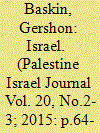

|
|
|
|
|
| Summary/Abstract |
Israel views itself as the nation-state of the Jewish people, and Prime Minister Binyamin Netanyahu demands that the Palestinians recognize Israel as such as a prerequisite to what he claims would be genuine negotiations on a two-state solution. The proposals to partition Palestine/Eretz Yisrael into two states for two peoples date as far back as 1937 to the Peel Commission, and were based on the assertion that the Israeli-Palestinian conflict is an identity-territorial conflict between two national movements over the territorial expression of their separate identities.
|
|
|
|
|
|
|
|
|
|
|
|
|
|
|
|
| 7 |
ID:
153095
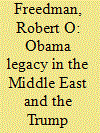

|
|
|
|
|
| Summary/Abstract |
During the second term of President Barack Obama, US-Israeli relations sharply deteriorated. After a positive visit by President Obama to Israel in March 2013, major disagreements erupted over the Israeli-Palestinian peace process, over the nuclear deal with Iran and, especially, over the construction of Jewish settlements in the Israeli-occupied West Bank. Making matters worse, personal recriminations crept into the Israeli-American dialogue on the disputes. While the two countries signed a major military assistance agreement in September 2016, Israeli settlement expansion after the election of Donald Trump as the US President in November 2016 led to a further deterioration of relations between the Obama Administration and Israeli Prime Minister Binyamin Netanyahu, which was demonstrated by the Obama Administration’s failure to veto a UN Security Council Resolution condemning Israeli settlements.
|
|
|
|
|
|
|
|
|
|
|
|
|
|
|
|
| 8 |
ID:
115408


|
|
|
| 9 |
ID:
128180
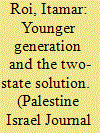

|
|
|
|
|
| Publication |
2012.
|
| Summary/Abstract |
With time and demographic trends on Hamas' side, moderates on all sides must cooperate to bring about the two-state solution.
|
|
|
|
|
|
|
|
|
|
|
|
|
|
|
|
|
|
|
|
|